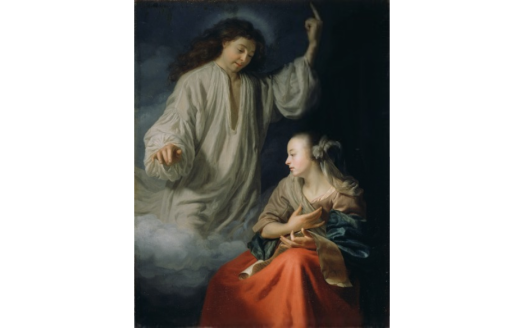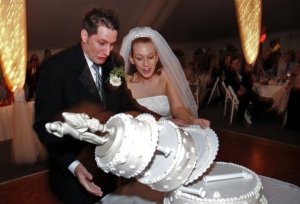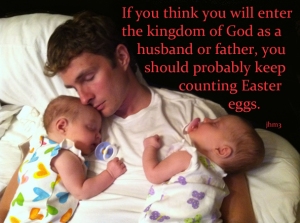
Fifty years ago such a question would have been unheard of because it was expected that everybody was a virgin when they married, men and women. That was back when self-control was valued as a character trait when people chose mates. Now we have a world void of any biblical standards where it’s unusual for either one to be a virgin at marriage, a world where experience in everything reigns supreme. I’m sure many people reading this would say times have changed and that a virgin should not expect to marry a virgin. But I don’t think it’s too late to return to those innocent times and reclaim Christian standards and dignity for those who are following God’s commandments. First, we’ve got to know why sexual relationships belong only in marriage and we have to be willing to defend those standards in a lost world. We also have to know what we’re waiting on. Since marriage is symbolic of the marriage between Christ and the church, it is also symbolic of their states before marriage. Christ is a virgin and his bride, the church, will be too at the marriage feast in heaven. I don’t think he would settle for anything else. It only follows then that two people contemplating marriage on this earth would expect each other to be virgins. St. Ambrose reflected on this rather well:
“Consider, too, another merit of virginity. Christ is the spouse of the Virgin, and if one may so say of virginal chastity, for virginity is of Christ, not Christ of virginity. He is, then, the Virgin Who was espoused, the Virgin Who bare us, Who fed us with her own milk, of whom we read: ‘How great things hath the virgin of Jerusalem done! The teats shall not fail from the rock, nor
snow from Lebanon, nor the water which is borne by the strong wind.'”
So my answer to the question about whether a virgin should expect to marry another virgin is absolutely yes. Virginity is just as much a part of God’s creation as rocks, snow, water, wind, and marriage itself. For women, what better way is there to know if a man is really serious about them and willing to commit than to find out he committed to having no sex before marriage? Men can get sex anywhere today and the images are plastered wall to wall and ceiling to ceiling. For them, what better way is there to know that a woman is going to be faithful than to find out she has never been with another man? Our memories are something we do not have control over. All of our brains’ processes are part of God’s creation. They cannot be deleted. I’m sure you’ve heard the saying, “What happens in Vegas stays in Vegas.” Actually, that’s not possible because our brains are not SD cards that can be wiped clean at the touch of a button. And I’m sure you’ve heard about “no strings attached” intimate encounters. That’s not possible either because we can’t control what strings get attached. The Bible never tells us to forget. Such unwanted memories are the consequences of having sex before marriage. They cloud our expectations, jigsaw-puzzle our dreams, and rob our futures. Do you like the idea of having sex with not only your spouse on your wedding night, but every other person he/she has had sex with? There’s no app to fix that.
If you don’t think a virgin should expect another virgin, do you think she ought to consider marrying every man who shows an interest in her? To show just how disordered that line of thinking is, would you expect her to marry a man who has served 20 years in prison for rape and distribution of pornography? Would you expect a virtuous man to marry a female teacher who is facing multiple charges of having sex with students? No? What happened to all that forgiveness and graciousness and all that convictional kindness? The truth is, no amount of forgiveness can erase memories of sexual sin. No amount of cleansing and no amount of washing in the blood can do that. It can only have a negative impact on a marriage – namely, it increases the likelihood of divorce. The world doesn’t understand that God placed sexual immorality in its own category and that it can’t be compared to lying, cheating, stealing, or any other sin. Actually, virginity would still be the best choice before marriage if it were completely untied from any religious connotations. How can a man not think about his past lovers on his honeymoon night with his virgin bride? He can’t. How can he not wonder about the men his wife had sex with before him? He can’t. How can a woman not think about the men she slept with? She can’t. How can she forget about the plans they made for the future? She can’t. It seems that men and women prefer many of the same things before marriage. If men prefer virgins, why can’t women? I think they can and I think they should. It’s hypocritical for men to sleep around and then expect to marry a virgin. It’s just as hypocritical for women to sleep around and expect to marry a virgin. If bringing up the subject of virginity scares your boyfriend away, you can be assured he was not the man for you. If he tries to get the benefits of a husband before marriage, run fast the opposite direction. God made our brains and memories for a reason. We’re responsible for using them.
Since it is God’s design for two virgins to marry, it’s also normal for them to ask questions about each other’s sexual history. Such questions are as normal as asking about what makes a rainbow, why the sky is blue, and where the wind comes from. On the other hand, it is grossly abnormal for couples to ask each other about their past partners, how many children they have, if they have to pay child support, if they used “protection” during sex, if they have a sexually transmitted disease, or if they will ever see their lovers again. But the media would have us believe the opposite and that experience of all types is normal and inexperience is abnormal. Look at how virginity is presented on TV. The characters are almost always women. They are usually awkward and see their virginity as a burden to bear. They are vulnerable, easy to take advantage of, and basically don’t have a clue. However, the ones I know are wise beyond their years. They are special to me because I relate to them, no matter what age.
Ironically, the feminist movement is all about sexual empowerment and ridding the world of double standards. I’m all for empowerment that brings women’s expectations up to men’s. But instead, it has taken us backwards and given us a generation of young ladies who think their virginity is a selling point to get the right man and get ahead. They are not supposed to value virginity in men, though. As long as the guy has the right job, money, and social status, they are expected to accept whatever baggage he brings to the table, because women are not supposed to want sex. They just have to “give it up” when he wants it. Meanwhile, men have been expected to ride the party train and sew their wild oats. They are expected to be horn dogs every time they are in the presence of women. They are expected to “get her done” and hope she’s making breakfast in the morning. Meanwhile, the good guys are left behind. So the supposed equality that feminist were fighting for has instead led to the greatest inequality the world has ever seen. It’s past time for Godly men and women to stand up and tell the world what they expect and what they won’t tolerate. If they are virgins, they should express their desire for virgin husbands and wives. Men’s virtue ought to be valued just as much as women’s. If women continue their present course and think relationships are all about giving, then there will be no virtuous men to marry because they will continue to take what they want with no commitments. Why should they marry? And the trend will continue down through the ages with men getting a free ride and women left holding the baby carriage. Gift-giving is always more complex than it seems because there are three intertwining obligations – to give, to receive, and to reciprocate. It sets in motion a binding obligation cycle where one has to reciprocate with a gift of equal value. Mutual virginity at marriage helps ensure that this cycle starts on equal ground. Yes, the whole process can start with a simple question like, “I believe in waiting on marriage before having sex. Are you a virgin too?” This is a cultural and religious crossroads of such magnitude we can’t afford to make light of it.
Not only should we expect virginity in marriage, it is commanded by God himself in the Old Testament. Consider what He told Moses in Leviticus 21:13-14: “And he shall take a wife in her virginity. A widow, or a divorced woman, or profane, or an harlot, these shall he not take: but he shall take a virgin of his own people to wife.” Matthew 19:6 also states, “Wherefore they are no more twain, but one flesh. What therefore God hath joined together, let not man put asunder.” Can you think of a better way for a man and woman to be joined together than by sexual intercourse? Let’s turn the tables. Should newlyweds expect each other to be faithful to each other in marriage? If you answered yes, why shouldn’t a virgin have the same expectation of faithfulness to God before marriage? Double standards are so ingrained in our society that it’s hard to separate reality from fiction. If you look at what the world says about virginity, you will get a quick lesson in how Pharisees use straw men to support false beliefs. A straw man is merely the misrepresentation of someone else’s argument. In the case of virginity, it’s popular to exaggerate its importance. “Is that the only thing you’re worried about?” “So, you think sex is going to be better in marriage because you waited?” “That is so unforgiving. Haven’t you ever sinned?” “What if she’s not waiting on you?” “Don’t you want to know if you’re compatible?” And some try to put words in our mouths. For instance, “Do you expect to marry a virgin” can be twisted to “require a virgin to marry,” “demand a virgin to marry,” or even “owed a virgin to marry,” etc. The whole idea of waiting for anything is very painful to this world. “You expect a virgin at your age?” I never understood what the cutoff age is supposed to be. Oh, those vicious virgins are breaking through the barricades. Everybody run for cover!
Our God is very generous and wants the best for us. That includes virgin brides and grooms. If that seems selfish, we’re in good company. God himself is a selfish God. “For thou shalt worship no other god: for the LORD, whose name is Jealous, is a jealous God (Exodus 34:14).” Is it selfish to want to see a rainbow? Is it selfish to want to see a sunrise? I don’t think so. It’s being human. Just like it is to want to marry another virgin. Do you know who first uttered the word virgin? The Angel Gabriel. He mentioned it three times when talking to Mary. It appears nowhere else in the Bible. In other words, it is a word straight from heaven. But it still makes people uncomfortable. If you feel uncomfortable about asking your potential spouse such personal questions, think about the negative consequences on your marriage when one of you finds out the other has a sexual past. The best thing to do is to not marry the wrong person. Are you going to let the world dictate what you can and cannot expect from your spouse? Or are you going to let the Bible’s standards inform you of what God expects? Of course a virgin should expect to marry another virgin. That is not being judgmental. It is acknowledging God as our creator, the Bible as his inspired word, and his wisdom that far surpasses our understanding.
Click to access 0339-0397,_Ambrosius,_De_Virginibus_Ad_Marcellinam_Sororem_Sua_Libri_Tres_%5BSchaff%5D,_EN.pdf
http://www.russellmoore.com/2010/03/10/how-much-do-i-need-to-know-about-my-potential-spouses-sexual-past-my-response/
Home














![church20family1_thumb[1]](https://johnhughmorgan3.files.wordpress.com/2016/08/church20family1_thumb1.gif?w=300&h=221)



































You must be logged in to post a comment.